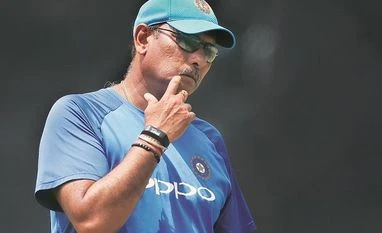The love-hate relationship between India and Pakistan will be on full display in the days leading up to the ICC Men’s T20 World Cup at the Dubai International Cricket Stadium on October 24. Star Sports, the official broadcaster, has already started promotions by bringing back its “Mauka Mauka” ad campaign that highlights the competitiveness and camaraderie between Indians and Pakistanis.
The choice of Dubai as a location is poignant as it is one of those places where citizens from these beleaguered South Asian neighbours can mingle freely without being harassed by a visa regime that strictly regulates people-to-people contact. Unfortunately, the cost of travel to Dubai is forbidding for most cricket lovers.
There is reason to believe that sports, like art and culture, can play a role in fostering goodwill and opening doors for friendship. This is a channel of communication that we must keep alive, especially when formal dialogue at the highest levels of government appears to be at a standstill, at least in the public eye. Sportspersons are youth icons, and they can use their voice to build ties of trust.
Former Indian cricketer and current Indian head coach Ravi Shastri’s new book Star Gazing: The Players in My Life (2021), co-authored with sports writer Ayaz Memon, is a brilliant case in point. Published by HarperCollins India, it celebrates all the cricketers that Shastri has “admired, enjoyed playing with/against or watching, and above all, learnt from in the past 50 years.” Many of them are Pakistanis.
In “Run Machine”, the chapter on Zaheer Abbas, Shastri recollects that he used to call the man “Ab-Bas” as he was “a relentless run maker against India.” The chapter on Javed Miandad, fondly addressed as “Zed”, is “Ready for Battle.” The chapter on Wasim Akram is “Waz to My Shaz”. It gets its name from the Shaz and Waz Show that Shastri and Akram used to co-host for ESPN-Star Sports.
Shastri is uninhibited in his appreciation of Zed’s talent. He writes, “With a high backlift, he would come down on the ball late, flex his tensile wrists and give the ball a nudge in the direction he wanted. The timing was sweet, almost a caress, sending the ball speeding to the boundary.” Memon’s co-authorship also deserves praise.
The book has a chapter titled “Kaptaan Khan” about Imran Khan’s poise and leadership, another called “Thunderbolt Unleashed” devoted to Waqar Younis, and a chapter titled “Super Hit” about Inzamam-ul-Haq who is nicknamed “Inzy”. Shastri deconstructs their technique, and spells out what he learnt from them on and off the field. He views them not only as opponents but also as colleagues.
Beyond the world of cricket, it is important to look at the contributions of India’s star javelin thrower Neeraj Chopra who won a gold medal at the recent Tokyo Olympics. He truly embodied the vision of the International Olympic Committee, which is “to build a better world through sport”, when he stood by his Pakistani counterpart Arshad Nadeem and urged Indian fans not to spread any hateful propaganda.
He tweeted, “Sports teaches us to be together and united.” He also posted a video, saying, “Hum aapas mein pyaar se rehte hain, achhe se baat karte hain, koi bhi aisi baat na karein jisse humein thes pohonche.” (“We have great affection for each other, please don’t do anything that would hurt us.”)
In March 2021, Indian tennis star Rohan Bopanna and Pakistani tennis star Aisam-ul-Haq reunited in Mexico to play as the “Indo-Pak Express”. These men had started the “Stop War, Start Tennis” campaign in 2010. They were defeated in the first game in Mexico but perhaps an Indian and a Pakistani playing on the same team is in itself a victory. They came together again in September to play in Bulgaria.
These players have also won the Arthur Ashe Humanitarian Award, given to people “possessing strength in the face of adversity, courage in the face of peril and the willingness to stand up for their beliefs no matter what the cost.” Will Indian and Pakistani cricketers join forces to send out a message for peace, or will they get carried away by jingoism? We will have to wait and watch.
It is hard to forget what Navjot Singh Sidhu said to Imran Khan at the opening of the Kartarpur Sahib Corridor in 2019: “If a corridor can open because of one hug, then I will give another hug…A second, third, sixth, a hundred hugs…Let us solve all issues through such hugs…Why get innocent sons of mothers killed on borders?” Making an appeal for peace, he said, “Hor, hor, hor, yeh dil maange more!” ("The heart wants more!")
India’s Virat Kohli and Pakistan’s Babar Azam may not be able to recreate Sidhu’s verbal wizardry but the two captains can certainly bat for peace in Dubai.
Unlock 30+ premium stories daily hand-picked by our editors, across devices on browser and app.
Pick your 5 favourite companies, get a daily email with all news updates on them.
Full access to our intuitive epaper - clip, save, share articles from any device; newspaper archives from 2006.
Preferential invites to Business Standard events.
Curated newsletters on markets, personal finance, policy & politics, start-ups, technology, and more.
)